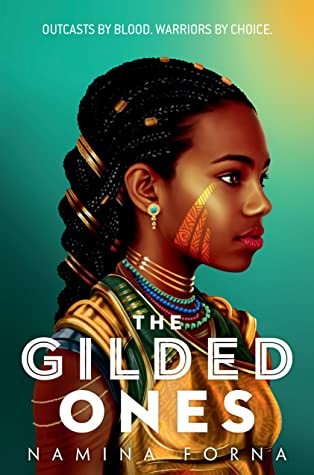Reading was not something I loved to do when I was a tweenager! And I know that may come to you as a surprise considering my line of work, but that’s the truth. I mean, we were made to read books in our time. “Go to the naughty corner (or your room) and read your book!” – a parent would say to a recalcitrant tweenager. “Go to the library and read a book; and think about what you did wrong”, my teacher would say to me for being disruptive in class. What? You didn’t think I gave my teachers stress, like some of you are doing now? LoL!!
The Gilded Ones
And when that happened, I would refuse to read a book. Within moments, I would realise I was bored and wanted something to do in my confined space. Then I would reach for a book to just flip through the pages, and I found myself reading. Then, next thing I knew, I was either bursting out laughing or tearing up because I was moved by the story, and “Your time is up; you can go back to class”, the librarian would announce to me.
And this was how my love for reading was nurtured. I loved to read because it took me to some place instead of the current place I found myself, especially if I didn’t like it there. Through reading, I had travelled to many different countries around the world before actually setting foot there. The places I enjoyed the most, mainly because they tugged at the African in me (read as relatable), were Senegal, Kenya, Nigeria, South Africa and somewhere in the deep south of America (a predominantly African American community). When I was in secondary school, by which time my love for reading was firmly established, I read books by African authors. Again, not by choice, but this time I’d say it was curated…deliberately chosen to have a certain effect on our thinking, maybe? Or not?
I will admit that these books exposed me to the cultures of some settings in Africa. I found out that Senegal is a West African country that has a 95 percent Muslim population and considered begging for alms a part of their culture. Soweto in South Africa, when I read about it, was a place where African children had to live with the reality and harsh effects of Apartheid; Kenya’s Mau Mau revolution to reclaim their land and freedom from the colonisers. When I read Chinua Achebe’s Things Fall Apart, I was taken in by how very verbose and colourful Nigerians were with language – and the intrusion of Western missionaries and colonial governments among the Igbos.
What all these books did for me was to prepare me for my later travels to these countries. I was knowledgeable (albeit a tad) about these countries to the point where I could hold conversations with their citizens when we met. Remember, in our time, we didn’t have the Internet, which now allows you to read up on anything and anywhere under the sun before you venture there.
I love my African-authored books, especially those that dwell on their culture and societal structures or challenges. I have noticed, though, that many of you do not have such books in your collection nor have you read any (or should that be, enough?) To be fair, finding such books – targetted at you, tweenagers – is quite the task, so I’m not blaming you. However, I would love to introduce you to a few of these books; read them before you finish secondary school, and you will notice how your perspective in and about life will shape up
- Things Fall Apart – Chinua Achebe (Penguin Modern Classics edition): the struggle between change and tradition is explored through the life of a young Nigerian man, Okonkwo.
- Purple Hibiscus – Chimamanda Ngozi Adichie: explores the themes of religious hypocrisy, finding one’s voice, and the persistence of love through the story of a young Nigerian woman struggling to find her way in a world beset with conflict and strife.
- The Marriage of Anansewaa – Ama Ata Aidoo: tells of a father, Ananse, who submits his daughter’s suitors to test to find out which one of them can display financial strength and also seek the welfare of his daughter.
- The Gilded Ones – Namina Forna: an action-packed new fantasy series following the story of a young female, named Deka, who lives in the West-African-inspired society of Otera, where women live to be of service to men, and their roles in everyday life are grounded in misogyny.










